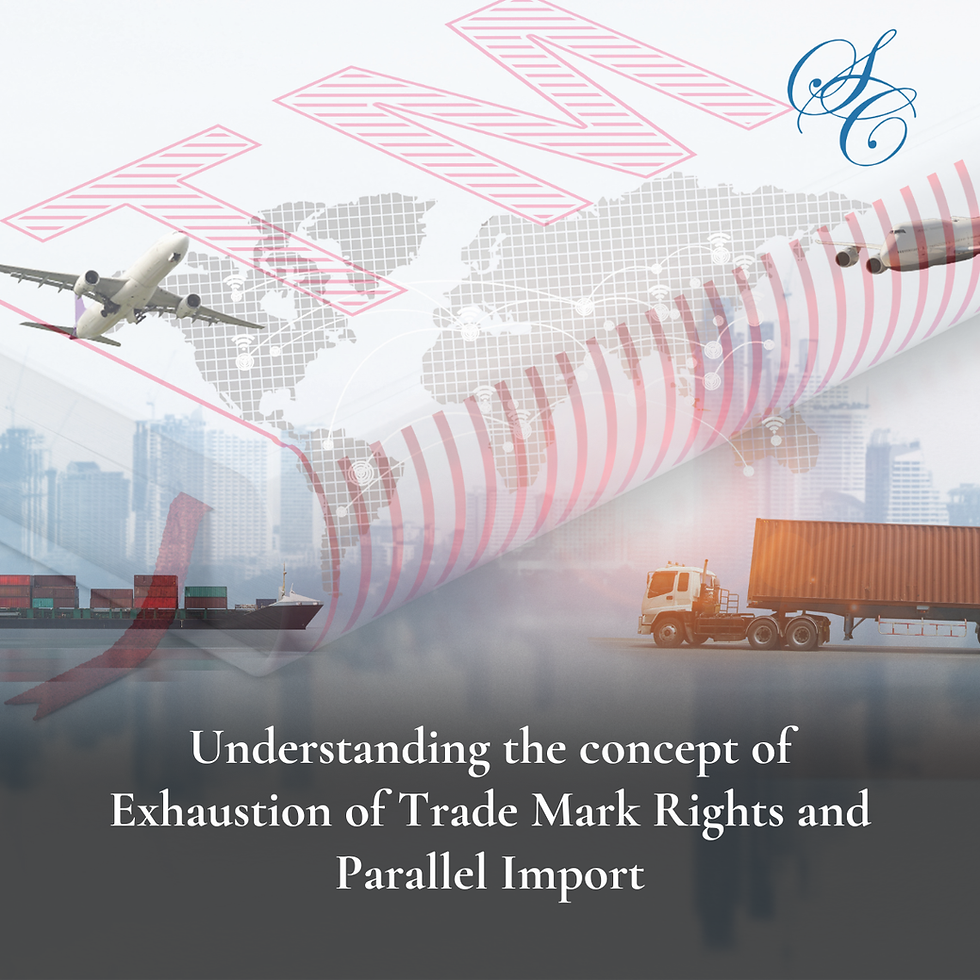Intermediary Liability – An E-Commerce Perspective
- Sarwajeet Singh
- Jan 17, 2019
- 4 min read
In 2013, India’s Supreme Court in Shreya Singhal v. Union of India, (2013) 12 SCC 73 caused many online marketplaces in the country to disregard complaints of infringement on such marketplaces. This post discusses how the scenario might be changing.
Online marketplaces in India celebrated the Supreme Court’s 2013 decision requiring them to act on complaints (including take-down requests based on IP violations) if and only if a court ordered them to do so. For example, online marketplaces would be particularly non-responsive to takedown requests where a trademark infringer did not use a mark identical to a complainant’s mark although there are elements of deceptive similarity.
However, recently, brand owners have, in court, started attacking the “immunity” claimed by online market places at its very roots. The “immunity” claimed by these online market places is, essentially, based on their websites qualifying as “intermediaries” under India’s IT laws. If brand owners can show that these marketplaces are not intermediaries, they would no longer be immune.
In a series of judgements in November 2018, the Delhi High Court denied online marketplaces immunity for being an intermediary. See: Christian Louboutin Sas vs Nakul Bajaj & Ors, Decision dt. 2.11.2018 in CS(COMM) 344/2018, Luxottica Group S.P.A. & Anr. v. Mify Solutions Pvt. Ltd. & Ors. Decision dt. 12.11.2018 in CS(COMM) 453/2016, Skullcandy, Inc. v. Shri Shyam Telecom & Ors., Decision dt. 12.11.2018 in CS(COMM) 979/2016 and L’Oreal v. Brandworld & Anr. Decision dt. 12.11.2018 in CS(COMM) 980/2016.
In the Christian Louboutin case (on the basis of which the other three cases were decided), the Delhi High Court examined the defendant’s (an online marketplace) website and opined that, while the web site had features indicating that it was an intermediary, it also had features uncharacteristic of intermediaries. Among the twenty-one (21) “non-intermediary” factors listed by the court were that the web site provides authenticity guarantees, gives discounts to consumers, promotes its own affiliate companies, and advertises products. These factors, as per the Court takes the web site out of the definition of an intermediary. The Court also noted that if online marketplaces fail to diligently protect a brand owner’s IP, such failure could amount to “conspiring, aiding, abetting or inducing unlawful conduct” and would disqualify such web sites from the safe harbour exemption under India’s laws.
In 2013, India’s Supreme Court in Shreya Singhal v. Union of India, (2013) 12 SCC 73 caused many online marketplaces in the country to disregard complaints of infringement on such marketplaces. This post discusses how the scenario might be changing.
Online marketplaces in India celebrated the Supreme Court’s 2013 decision requiring them to act on complaints (including take-down requests based on IP violations) if and only if a court ordered them to do so. For example, online marketplaces would be particularly non-responsive to takedown requests where a trademark infringer did not use a mark identical to a complainant’s mark although there are elements of deceptive similarity.
However, recently, brand owners have, in court, started attacking the “immunity” claimed by online market places at its very roots. The “immunity” claimed by these online market places is, essentially, based on their websites qualifying as “intermediaries” under India’s IT laws. If brand owners can show that these marketplaces are not intermediaries, they would no longer be immune.
In a series of judgements in November 2018, the Delhi High Court denied online marketplaces immunity for being an intermediary. See: Christian Louboutin Sas vs Nakul Bajaj & Ors, Decision dt. 2.11.2018 in CS(COMM) 344/2018, Luxottica Group S.P.A. & Anr. v. Mify Solutions Pvt. Ltd. & Ors. Decision dt. 12.11.2018 in CS(COMM) 453/2016, Skullcandy, Inc. v. Shri Shyam Telecom & Ors., Decision dt. 12.11.2018 in CS(COMM) 979/2016 and L’Oreal v. Brandworld & Anr. Decision dt. 12.11.2018 in CS(COMM) 980/2016.
In the Christian Louboutin case (on the basis of which the other three cases were decided), the Delhi High Court examined the defendant’s (an online marketplace) website and opined that, while the web site had features indicating that it was an intermediary, it also had features uncharacteristic of intermediaries. Among the twenty-one (21) “non-intermediary” factors listed by the court were that the web site provides authenticity guarantees, gives discounts to consumers, promotes its own affiliate companies, and advertises products. These factors, as per the Court takes the web site out of the definition of an intermediary. The Court also noted that if online marketplaces fail to diligently protect a brand owner’s IP, such failure could amount to “conspiring, aiding, abetting or inducing unlawful conduct” and would disqualify such web sites from the safe harbour exemption under India’s laws.
By questioning whether an online marketplace is an intermediary on the basis of the way its website is set up, courts are now closely scrutinizing their businesses. While online marketplaces have often claimed intermediary immunity by asserting that they are entirely neutral platforms, they would now need to start acting like entirely neutral platforms as well. Notably, online marketplaces that position their own subsidiaries/affiliates in a manner that prejudices independent sellers should not be so sure of their status as “intermediaries” under India’s IT laws. It will be interesting to see how online marketplaces react to these rulings–will these marketplaces start taking IP complaints filed by brand owners more seriously, or will they appeal these rulings.




Comments